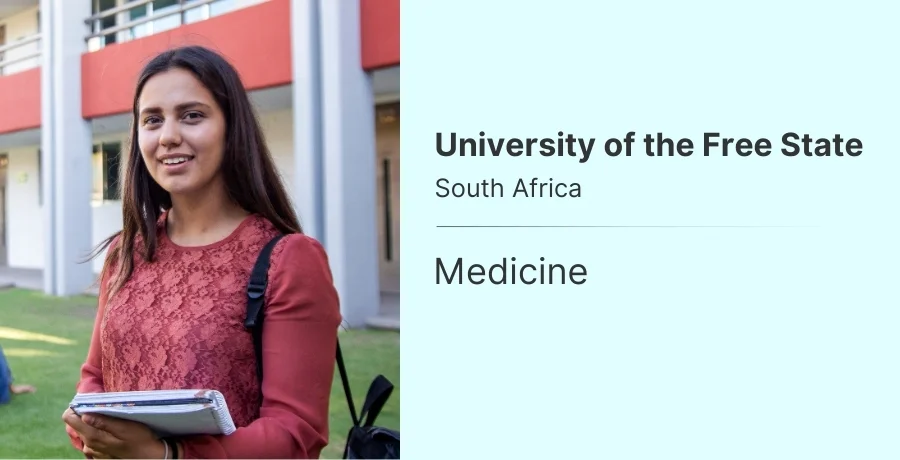University of Cape Town (UCT) – Highlights
The University of Cape Town (UCT), established in 1829, is South Africa's oldest university and one of the leading higher education institutions in Africa. Known for its picturesque campus nestled on the slopes of Table Mountain, UCT has consistently been ranked among the top universities globally. With a rich history and a commitment to excellence, UCT is renowned for its diverse academic offerings, cutting-edge research, and a vibrant campus community. The university attracts students from all over the world, creating a multicultural and inclusive environment that fosters innovation and critical thinking.
- Year of Establishment: 1829
- QS Ranking: Top 200 globally
- Other Rankings:
- Top 10 in Africa
- Top 300 for graduate employability
- Top 100 for Development Studies
- Top 150 for Life Sciences and Medicine
- Top 200 for Social Sciences and Management
- Infrastructure: State-of-the-art labs, libraries, and sports facilities
- Teaching Faculty Experience: World-class faculty with extensive research experience
- Funding: Well-funded through government and private grants
- Accreditation: Accredited by the South African Department of Higher Education and Training
University of Cape Town (UCT)- Admissions
The University of Cape Town (UCT) has a rigorous admission process that seeks to identify the most talented and motivated students from around the globe. UCT values diversity and inclusivity, welcoming a significant percentage of international students each year. The university operates on a semester system with intakes in February and July, providing flexibility for students from different educational backgrounds. UCT's modern infrastructure supports a conducive learning environment, with facilities that cater to the academic and extracurricular needs of students.
- Percentage of International Students: Approximately 20%
- Semesters and Intakes: February and July
- Infrastructure: Comprehensive facilities including libraries, labs, and sports centers
UG Admissions
- Completed high school with a minimum GPA requirement.
- Submission of standardized test scores (SAT/ACT) is optional but recommended.
- English language proficiency proof for non-native speakers (TOEFL/IELTS).
- Personal statement and letters of recommendation.
- Participation in extracurricular activities and community service is a plus.
PG Admissions
- Undergraduate degree from a recognized institution.
- Minimum GPA requirements specific to the program.
- Submission of GRE/GMAT scores where applicable.
- English language proficiency proof for non-native speakers (TOEFL/IELTS).
- Statement of purpose and letters of recommendation.
Ph.D. Admissions
- Master's degree in a relevant field from a recognized institution.
- Research proposal outlining the intended area of study.
- Proof of research experience and publications.
- English language proficiency proof for non-native speakers (TOEFL/IELTS).
- Letters of recommendation from academic supervisors.
To know more about other universities in the SouthAfrica, click here.
Eligibility Criteria
UG Programs
- Engineering: Offers various disciplines including civil, electrical, and mechanical engineering.
- Commerce: Focuses on business administration, economics, and accounting.
- Health Sciences: Includes medicine, nursing, and public health programs.
- Humanities: Offers courses in literature, history, and philosophy.
- Law: Comprehensive law program with various specializations.
PG Programs
- MBA: Renowned for its strong emphasis on leadership and innovation.
- Masters in Engineering: Advanced courses in various engineering fields.
- Masters in Public Health: Focuses on global health issues and research.
- Masters in Computer Science: Covers advanced topics in AI, data science, and software engineering.
- Masters in Law: Specialized programs in international law, human rights, and commercial law.
University of Cape Town (UCT) -Programs
UCT offers a wide range of programs across various fields, catering to both undergraduate and postgraduate students. The university emphasizes interdisciplinary learning and research, providing students with the skills and knowledge needed to excel in their chosen careers.
UG Programs
- Bachelor of Arts: Diverse courses in social sciences, humanities, and arts.
- Bachelor of Science: Specializations in biology, chemistry, physics, and environmental science.
- Bachelor of Commerce: Focus on economics, finance, and management.
- Bachelor of Engineering: Comprehensive engineering disciplines including civil, electrical, and mechanical.
- Bachelor of Laws (LLB): In-depth legal education with various specializations.
PG Programs
- Master of Business Administration (MBA): Leadership and management program.
- Master of Science: Advanced studies in various scientific disciplines.
- Master of Engineering: Specialized engineering courses.
- Master of Public Health: Focus on global health and research.
- Master of Laws (LLM): Specialized legal studies in various fields.
Accommodation
UCT offers a variety of accommodation options to suit the needs of its diverse student population. On-campus accommodation provides convenient access to university facilities and fosters a strong sense of community. Students can also choose off-campus housing, which offers more independence and flexibility. Various housing options are available, including shared apartments, private rooms, and family accommodations.
- On-campus accommodation: Convenient and community-oriented living spaces.
- Off-campus accommodation: Independent living with various housing options.
- Housing options: Shared apartments, private rooms, and family accommodations.
Cost of Tuition Fees
The cost of tuition fees at UCT varies depending on the program and level of study. Below are approximate figures for undergraduate and postgraduate fees.
| Program | Approximate Fees (per year) |
|---|---|
| Undergraduate | R50,000 - R70,000 |
| Postgraduate | R60,000 - R80,000 |
Cost of Living
The cost of living in Cape Town can vary based on lifestyle and accommodation choices. Below are approximate monthly expenses.
| Expense | Approximate Cost (per month) |
|---|---|
| Rent, Travel, Utility | R8,000 - R12,000 |
| Food & Drink, Entertainment | R3,000 - R5,000 |
Scholarships
UCT offers various scholarships to support students financially. Below is a list of the top 10 scholarships available, along with the maximum amount offered.
| Scholarship Name | Maximum Amount Offered (per year) |
|---|---|
| UCT Entrance Scholarship | R50,000 |
| International Academic Scholarship | R40,000 |
| Merit Scholarship | R30,000 |
| Postgraduate Bursary | R60,000 |
| Research Scholarship | R70,000 |
| Sports Scholarship | R20,000 |
| Need-Based Grant | R40,000 |
| Alumni Scholarship | R25,000 |
| Faculty Scholarship | R35,000 |
| Leadership Award | R45,000 |
Placements
UCT has a strong track record of successful placements, with a high placement rate for its graduates. The university's career services offer extensive support to students, helping them secure positions in top companies and organizations.
The placement rate at UCT is over 85%, with graduates finding roles in various industries. Below are the major job roles with the highest approximate salaries.
| Job Role | Approximate Salary (per year) |
|---|---|
| Software Engineer | R600,000 |
| Data Scientist | R650,000 |
| Financial Analyst | R550,000 |
| Consultant | R700,000 |
| Project Manager | R650,000 |
| Research Scientist | R600,000 |












